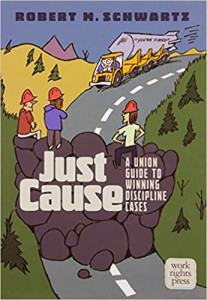[caption id="attachment_10073" align="alignnone" width="207"] "Just Cause: A Union Guide to Winning Discipline Cases."[/caption]
"Just Cause: A Union Guide to Winning Discipline Cases."[/caption]
Abusive bosses, arbitrary discipline and unjust firings are all-too common in American workplaces. On the other hand, union agreements typically contain contract language that calls for “just cause” in workplace disciplinary actions. So, how do you get justice in the context of a workplace, which after all is not a democracy?
Well-known labor lawyer Bob Schwartz recently gave a 30-minute “Know Your Rights” talk for Local 888 members that focused on one of his books, "Just Cause: A Union Guide to Winning Discipline Cases." He told the Local 888 leaders and staff in attendance (via Zoom) that “there’s probably been about 100,000 printed labor arbitrations over the years, and gradually there’s been a consensus around certain principles, that unions have fought for, on the issue of ‘just cause’.”
One of those, he said, is that — when it comes to employee discipline — the “employer has an obligation to point out a rule, along with the possible penalties for disobeying the rule.”
Schwartz warned: “If a member has not read the handbook or read the contract, that’s not going to work as a defense.” A valid defense, he said, could be to show that a rule has not been enforced for months — or even years. In that case, he said, “an employee may reasonably conclude that the rule no longer applies.”
Writing for Labor Notes, Charles Borchert said that “Just Cause,” like all of Schwartz’s books, “is easy to read and understand. He writes not in the tone or language of an attorney (which he is), but with an easy writing style (https://labornotes.org/blogs/2012/10/just-cause-union-guide-winning-discipline-cases).”
“Before reading this book,” added Borchert, “I thought that I knew all about “just cause” for discipline. … I quickly saw that I still had much to learn from the specific examples Schwartz gave.”
In addition to "Fair Notice," Schwartz’s talk for Local 888 also covered:
- Active enforcement: Punishment may not be imposed for alleged misconduct that the employer has tolerated for a prolonged period.
- Due Process: There should be a fair procedure, and management must conduct an interview or a hearing before issuing discipline.
- Substantial Proof: Discipline should not be based rumors.
- Equal Treatment: Those committing the same offense should have fair, comparable outcomes.
- Progressive Discipline: If the conduct in question is not extreme, the employer should start with lesser penalties rather than moving immediately to suspension or firing.
- Mitigating and Extenuating Circumstances: Discipline must be proportional to the gravity of the offense, taking circumstances into account.
Schwartz advised that the best time to intervene in a case is before the employer is “locked into” a decision.
Members can request a summary of Schwartz's, "Seven Basic Principles of Just Cause" by emailing myunion@seiu888.org
